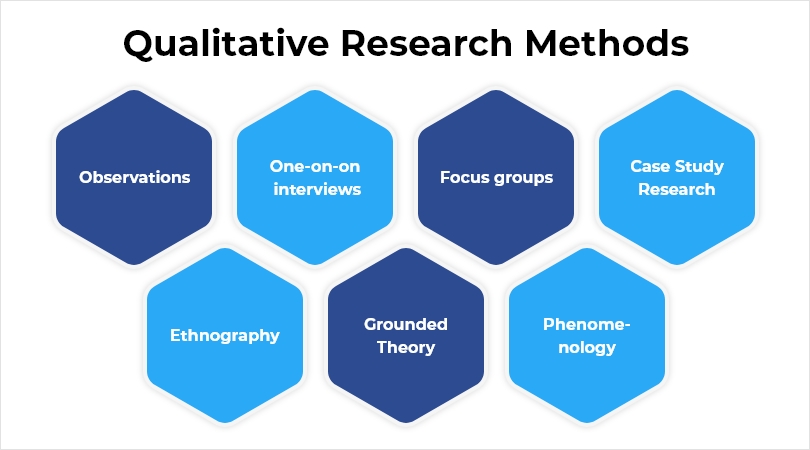Different Types of Qualitative Studies You Need to Know
Category : Educational Articles | Author: Hanson Pepple Published on 2024-03-06 22:18:13

What is a qualitative study design?
A qualitative research method is a systematic approach used to collect, analyze, and interpret qualitative data in order to understand social phenomena from the perspective of the participants. Qualitative research methods focus on exploring subjective experiences, meanings, and interpretations through in-depth examination of rich, contextual data.
Qualitative research methods are characterized by their
emphasis on understanding the complexities and nuances of human behavior,
attitudes, and interactions within their natural contexts. Unlike quantitative
research methods, which prioritize measurement, statistical analysis, and
generalizability, qualitative research methods prioritize depth, richness, and
contextuality in understanding social phenomena.
Types of qualitative study designs
Qualitative studies encompass a variety of research approaches and methodologies, each tailored to address different research questions and objectives. Some common types of qualitative studies include:
Interview Studies:
Interview studies involve conducting structured or
semi-structured interviews with participants to gather in-depth information
about their experiences, perspectives, attitudes, or behaviors. Interviews can
be conducted one-on-one or in focus groups and allow researchers to explore
complex topics in depth.
Research
Philosophy: Interview studies can be conducted within
various research paradigms, including interpretivism, constructivism, or
pragmatism, depending on the researcher`s goals and perspectives.
Epistemology:
Researchers
aim to understand participants` subjective experiences, perspectives, and
meanings attributed to phenomena, often through in-depth exploration and
interpretation of interview data.
Ontology:
Ontologically, interview studies recognize the socially constructed nature of
reality, acknowledging that individuals` perceptions and interpretations shape
their experiences.
Data
Collection: Data collection involves conducting
structured, semi-structured, or unstructured interviews with participants,
allowing them to share their thoughts, experiences, and perspectives on the
research topic.
Data
Analysis: Analysis methods may include thematic analysis, content
analysis, or narrative analysis, wherein researchers identify patterns, themes,
and meanings within the interview transcripts.
Limitations:
Limitations may include potential biases in participant responses, such as
social desirability bias or interviewer bias, as well as challenges related to
data saturation and generalizability of findings.
Ethical
Considerations: Ethical considerations include obtaining
informed consent, ensuring confidentiality and anonymity, and minimizing
potential harm or discomfort to participants during interviews.
You may also like: Cambridge Gates Scholarships for International Students
Observational Studies:
Observational studies involve directly observing and
recording phenomena in their natural settings. Researchers may use structured
or unstructured observation methods to document behaviors, interactions, or
environmental conditions. Observational studies are often used to study social
interactions, environmental dynamics, or cultural practices.
Research
Philosophy: Observational studies often align with
interpretivist or constructionist research paradigms, emphasizing the
importance of understanding social phenomena within their natural contexts.
Epistemology:
Researchers aim to gain insights into participants` behaviors, interactions, or
environmental dynamics through direct observation and interpretation of
observational data.
Ontology:
Ontologically, observational studies recognize the dynamic and
context-dependent nature of social phenomena, acknowledging that reality is
socially constructed and subject to interpretation.
Data
Collection: Data collection involves systematic
observation of participants in their natural settings, using methods such as
participant observation, non-participant observation, or structured observation
protocols.
Data
Analysis: Analysis methods may include qualitative coding of
observational data, thematic analysis of observed behaviors or interactions, or
statistical analysis of observational variables.
Limitations: Limitations
may include observer bias, reactivity effects, or difficulties in maintaining
objectivity and consistency across observations.
Ethical
Considerations: Ethical considerations include obtaining
informed consent, ensuring privacy and confidentiality, and minimizing
disruption or intrusion into participants` natural environments during
observation.
You may also like: Top 10 Universities for International Students in UK
Ethnographic Studies:
Ethnographic studies involve immersing researchers in the
everyday lives and contexts of the participants to gain an insider`s
perspective on social phenomena. Ethnographers typically spend extended periods
of time in the field, participating in activities, conducting interviews, and
observing social interactions to understand cultural norms, values, and
practices.
Research
Philosophy: Ethnographic studies are typically conducted
within an interpretivist or constructionist research paradigm, emphasizing the
importance of understanding cultural phenomena from the perspective of the
participants.
Epistemology:
Researchers aim to gain insights into the cultural norms, values, and practices
of participants through immersive fieldwork and participant observation, often
focusing on understanding subjective meanings and interpretations.
Ontology:
Ontologically, ethnographic studies acknowledge the socially constructed nature
of reality and the importance of context in shaping individuals` experiences
and behaviors.
Data
Collection: Data collection involves extended periods of
fieldwork, including participant observation, informal conversations,
interviews, and document analysis, to immerse researchers in the everyday lives
and contexts of participants.
Data
Analysis: Analysis methods may include qualitative coding of field
notes, thematic analysis of observational data, or narrative analysis of
participants` stories and experiences.
Limitations:
Limitations may include researcher subjectivity, the potential for bias in
interpretation, and challenges related to establishing rapport and trust with
participants.
Ethical Considerations: Ethical considerations include obtaining informed consent, ensuring confidentiality and anonymity, and maintaining cultural sensitivity and respect for participants` beliefs and practices.
Case Studies:
Case studies involve in-depth analysis of a specific
individual, group, organization, or phenomenon within its real-life context.
Case studies may use multiple sources of data, including interviews,
observations, and document analysis, to provide a detailed examination of
unique or unusual cases and their implications.
Research
Philosophy: Case studies can be conducted within various
research paradigms, including interpretivism, pragmatism, or realism, depending
on the researcher`s goals and perspectives.
Epistemology:
Researchers aim to gain in-depth understanding of a specific case or phenomenon
within its real-life context, often through detailed analysis and
interpretation of multiple sources of data.
Ontology:
Ontologically, case studies recognize the uniqueness and complexity of
individual cases, acknowledging that reality is context-dependent and subject
to interpretation.
Data
Collection: Data collection involves gathering
information from multiple sources, including interviews, observations,
documents, and archival records, to provide a comprehensive understanding of
the case under study.
Data
Analysis: Analysis methods may include qualitative coding of data,
cross-case comparison, pattern-matching, or explanation-building, depending on
the research questions and objectives.
Limitations:
Limitations
may include difficulties in generalizing findings to broader populations,
potential biases in data collection or analysis, and challenges related to
maintaining objectivity and rigor in case study research.
Ethical Considerations: Ethical considerations include obtaining informed consent, ensuring confidentiality and anonymity, and minimizing potential harm or discomfort to participants during data collection and analysis.
Grounded Theory Studies:
Grounded theory studies aim to develop theories or
conceptual frameworks based on systematic analysis of qualitative data.
Researchers use an iterative process of data collection, coding, and theory
development to identify key concepts, categories, and relationships emerging
from the data, allowing for the generation of new theoretical insights.
Research
Philosophy: Grounded theory studies are typically
conducted within an interpretivist or constructionist research paradigm,
emphasizing the importance of understanding social phenomena from the
perspective of the participants.
Epistemology:
Researchers aim to develop theories or conceptual frameworks based on
systematic analysis of qualitative data, often focusing on uncovering patterns,
categories, and relationships emerging from the data.
Ontology:
Ontologically, grounded theory studies acknowledge the dynamic and iterative
nature of theory development, recognizing that theories emerge from the data
rather than being imposed a priori.
Data
Collection: Data collection involves iterative cycles of
data collection and analysis, allowing researchers to systematically gather and
interpret qualitative data until theoretical saturation is reached.
Data
Analysis: Analysis methods may include open coding, axial coding,
and selective coding, wherein researchers identify key concepts, categories,
and relationships within the data and develop a theoretical framework to
explain them.
Limitations:
Limitations may include potential biases in data collection or analysis,
challenges related to theory development and refinement, and difficulties in
achieving theoretical saturation.
Ethical
Considerations: Ethical considerations include obtaining
informed consent, ensuring confidentiality and anonymity, and minimizing
potential harm or discomfort to participants during data collection and
analysis.
Narrative Studies:
Narrative studies focus on collecting and analyzing
individuals` stories or narratives to explore personal experiences, identity
construction, or sense-making processes. Researchers may use methods such as
life history interviews, storytelling, or narrative analysis to uncover themes,
motifs, and structures within personal narratives.
Research
Philosophy: Narrative studies can be conducted within
various research paradigms, including interpretivism, constructionism, or
postmodernism, depending on the researcher`s goals and perspectives.
Epistemology:
Researchers aim to explore personal experiences, identities, or sense-making
processes through analysis of individual or collective narratives, often
focusing on understanding subjective meanings and interpretations.
Ontology:
Ontologically,
narrative studies recognize the importance of storytelling and narrative
construction in shaping individuals` identities, experiences, and social
realities.
Data
Collection: Data collection involves gathering narrative
data from participants through methods such as life history interviews,
storytelling, or written narratives, allowing researchers to explore themes,
motifs, and structures within personal narratives.
Data
Analysis: Analysis methods may include thematic analysis of
narrative data, narrative analysis, or structural analysis, wherein researchers
identify recurring themes, plot structures, and narrative devices within the
narratives.
Limitations:
Limitations may include potential biases in participant narratives, challenges
related to interpretation and analysis of subjective data, and difficulties in
ensuring the representativeness and generalizability of findings.
Ethical
Considerations: Ethical considerations include obtaining
informed consent, ensuring confidentiality and anonymity, and respecting
participants` rights and autonomy in sharing their personal narratives.
Phenomenological Studies:
Phenomenological Studies: Phenomenological studies aim to
explore individuals` lived experiences of a particular phenomenon or
phenomenon. Researchers seek to understand the essence or meaning of
participants` experiences by bracketing preconceptions and assumptions and
engaging in reflective analysis of the data.
Research
Philosophy: Phenomenological studies are typically
conducted within an interpretivist or existentialist research paradigm,
emphasizing the importance of understanding individuals` lived experiences and
subjective realities.
Epistemology:
Researchers
aim to explore the essence or meaning of participants` lived experiences
through in-depth analysis and interpretation of qualitative data, often
focusing on uncovering underlying structures and patterns.
Ontology:
Ontologically, phenomenological studies recognize the importance of subjective
experiences and the lived world in shaping individuals` perceptions, emotions,
and behaviors.
Data
Collection: Data collection involves gathering rich,
descriptive data from participants through methods such as in-depth interviews,
reflective journaling, or phenomenological inquiry, allowing researchers to
explore the essence or meaning of lived experiences.
Data
Analysis: Analysis methods may include phenomenological reduction,
bracketing, and thematic analysis of qualitative data, wherein researchers
identify common themes, essences, and structures within participants`
experiences.
Limitations:
Limitations may include potential biases in participant perceptions or
interpretations, challenges related to researcher subjectivity, and
difficulties in achieving intersubjective agreement on the interpretation of
qualitative data.
Ethical
Considerations: Ethical considerations include obtaining
informed consent, ensuring confidentiality and anonymity, and respecting
participants` rights and autonomy in sharing their lived experiences.
Search
Categories
Most Previous Articles
- New solar cell production plant to boost power supply in Nigeria
- Fans call for Peseiro’s head as Super Eagles flop again
- Cambridge Gates Scholarship for International Students
- Top 10 UK Scholarships for International Students
- The Chevening Scholarship as One of UK’s Top Routes for International Student
- Oxford Clarendon Scholarships for International Students
- Oxford Clarendon Scholarships for International Students
- Fulbright UK Scholarship Program
- Top Ten Scholarships in the United States for International Students
- The Joint Japan/World Bank Graduate Scholarship Program
- The Joint Japan/World Bank Graduate Scholarship Program
- Different Types of Qualitative Studies You Need to Know
- Fully Funded Commonwealth Scholarship in UK
- TOP 10 AI YOU SHOULD KNOW IN 2024
- BREAKTHROUGH IN MEDICAL RESEARCH: AI ALGORITHM PREDICTS DISEASE OUTCOMES WITH UNPRECEDENTED ACCURACY
- INEC Announces Commencement of Continuous Voters` Registration for Edo and Ondo Polls Starting May 27
- Tech Giants Unveil Collaborative Initiative to Combat Climate Change Using AI and Data Analytics.
- NIGERIAN MUSICIAN PORTABLE ARRESTED FOR ALLEGED FAILURE TO PAY DEBT ON G-WAGON.
- Five commissioners serving in the cabinet of Governor Siminalayi Fubara have resigned from the Rivers State Executive Council.
- INEC chairman wants security beefed up ahead of Edo, Ondo elections.
